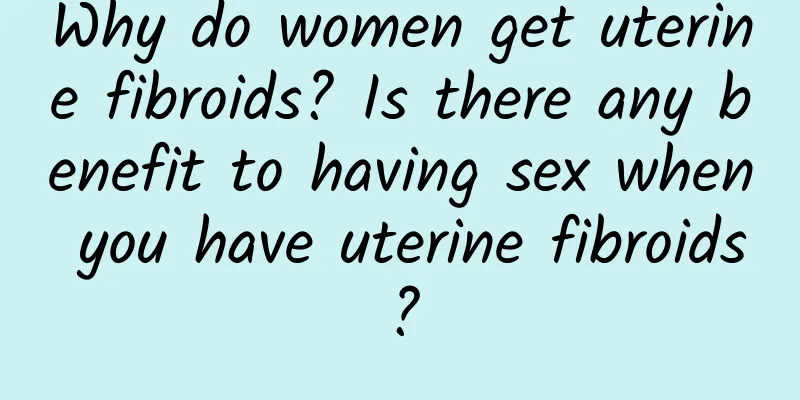How are uterine fibroids caused? Can improper use of health products also cause uterine fibroids?

|
How are uterine fibroids caused? Why do women suffer from uterine fibroids? This is a question many fibroid patients will ask when they recall their living habits and eating habits. Uterine fibroids are benign tumors of the female reproductive system, but friends with uterine fibroids must pay attention. 1. Improper use of health products. For example, long-term use of health products, because many health products, supplements, and cosmetics contain estrogen. Excessive intake can cause ovarian cysts, uterine fibroids and other gynecological diseases. 2. Long-term use of contraceptive pills. When many couples have sex, their husbands do not want to use condoms, and their wives can only take contraceptive pills for a long time to prevent pregnancy. It is well known that a large amount of hormones accumulate in the body, which may become a high-risk factor for uterine fibroids. 3. Tension, depression, boredom. Women suffering from uterine fibroids are often related to their personal character and emotions, especially when they are nervous, depressed, bored, or under great work pressure, which can easily reduce the body's resistance. 4. Heredity. Uterine fibroids have a certain hereditary tendency. 5. Obesity. On the one hand, fat is metabolized into estrogen, and uterine fibroids rely on estrogen for growth; on the other hand, for every 10 kg of overweight a woman has, her risk of developing uterine fibroids increases by 21%. 6. Childbearing age. The best childbearing age for women is 25 years old. Women who give birth later are more likely to suffer from uterine fibroids. 7. Environmental impact: Being in a toxic and harmful environment for a long time, such as being exposed to pesticides, eating eels and turtles fed with hormone-containing feed, etc. How to treat uterine fibroids? What should you do if you find yourself with uterine fibroids? How can uterine fibroids be treated more effectively? Generally speaking, doctors will decide which treatment method to take based on the patient's symptoms, age, whether they have fertility requirements, and other specific circumstances. Common treatments for uterine fibroids are as follows: 1. Regular follow-up. For patients with mild uterine fibroids, if there are no abnormal symptoms in the body, the uterine fibroids are relatively small, and there are no malignant changes, they can follow the doctor's advice to go to the hospital for regular follow-up examinations of the uterine fibroids. 2. Drug treatment. For patients with uterine fibroids who do not need surgical treatment and patients with uterine fibroids that cannot be treated surgically, drug treatment can generally be used. That is, the growth of uterine fibroids is inhibited by drug intake. For example, danazol is used for preoperative medication or treatment of uterine fibroids that are not suitable for surgery. Uterine fibroids can grow after discontinuation of medication. Taking danazol can cause liver damage. In addition, there are side effects caused by androgens, such as acne. 3. Surgical treatment. Mainly refers to myomectomy and hysterectomy, which can be performed through the abdomen or vagina, hysteroscopy or laparoscopy. Generally, the doctor will decide which surgery to use based on the patient's specific situation. Common knowledge about uterine fibroid care For patients with uterine fibroids, whether they are asymptomatic or have mild symptoms, or patients with severe symptoms, they need to know some daily care knowledge. While cooperating with doctors for treatment, we should also develop good living habits. The care knowledge for uterine fibroids mainly includes the following points: 1. In daily life, you should pay attention to rest, eat well, and avoid excessive fatigue, especially during the days of menstruation, you must get enough rest. 2. Pay attention to personal hygiene, especially the hygiene and cleanliness of the vulva. When taking a bath on weekdays, wash the vulva with clean water and keep it clean and dry. If there is too much vaginal discharge, wash the vulva at any time to avoid bacterial growth and infection. 3. If diagnosed with uterine fibroids, you must go to the hospital for regular checkups. If the symptoms increase slowly or not at all, the interval between two checkups can be relatively long. If a significant increase is found, surgical treatment should be considered to prevent the uterine fibroids from growing too large, compressing adjacent organs or causing severe bleeding. 4. Strengthen contraceptive measures. Although the chances of successful conception for patients with uterine fibroids may be relatively low, there are also cases of patients with uterine fibroids complicated with pregnancy, because uterine fibroids will increase the chance of miscarriage during pregnancy. Therefore, if the patient has a relatively large uterine fibroid, it is recommended to consider having a child after the tumor is cured, so as to avoid miscarriage during pregnancy, which will cause greater harm to the body. |
Recommend
Is it okay to go for medical abortion alone? What are the preparations for medical abortion?
Theoretically, medical abortion can be performed ...
Biopsy What are the symptoms of chronic cervicitis? There are four main symptoms of chronic cervicitis.
The symptoms of chronic cervicitis are diverse, t...
What are the self-treatment methods for cervicitis?
What are the self-treatment methods for cerviciti...
Experts explain the method of physical treatment for cervical erosion
For patients with cervical erosion with a large e...
What are the main treatments for pelvic inflammatory disease?
For the treatment of pelvic inflammatory disease,...
Huang Pingyang lost 9 kilograms and became a muscular man! The secret of a complete transformation is revealed
Huang Pingyang, a former pitcher for the Wei Chua...
How to effectively treat chocolate ovarian cysts?
Ovarian cysts are a common disease among women to...
What foods are good for preparing for pregnancy with uterine fibroids? What foods are taboo to eat with uterine fibroids?
What foods are good for preparing for pregnancy w...
The daily diet for irregular menstruation is as follows
Patients with irregular menstruation can adjust t...
5 Yoga Tips to Lose Fat Without a Tiger Back
[Key Points]: Fat easily accumulates on the back,...
Is medical abortion better or surgical abortion better?
Whether to choose medical abortion or surgical ab...
What are the traditional Chinese medicine treatments for uterine fibroids?
What are the traditional Chinese medicine treatme...
You can eat sugar without any burden! Nutritionist Zheng Shijia: These sweet fruits and vegetables can replace white sugar, and you can cook them to reduce sugar like this
People who love to eat sugar are worried that it ...
Experts tell you the symptoms and treatment of vulvar leukoplakia
Vulvar leukoplakia is now a very common gynecolog...
What medicine is best for cervicitis?
There is generally no best anti-inflammatory drug...









